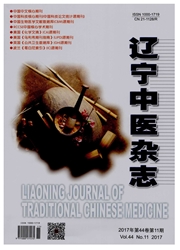

 中文摘要:
中文摘要:
目的:探讨食管癌患者在放射治疗后中医辨证分型与临床特征之间的关系。方法:在食管癌患者放疗后进行中医辨证分型,并收集患者放疗前后临床特征资料。结果:食管癌患者放疗后中医证型以阴虚热毒型占多数,56.25%。食管癌患者放疗后中医证型与原发部位、病理类型、放疗剂量、放射性食管炎均无相关性(P〉0.05)。但是,放疗后的中医证型与食管癌分化程度、KPS评分、骨髓抑制分度以及近期疗效具有相关性(P〈0.05),且都符合正相关趋势。结论:食管癌患者放疗后中医证型与分化程度、KPS评分、骨髓抑制分度以及近期疗效的临床特征有关。某些临床特征可以指导现代中医对于本病性质的认识,甚至可能是中医证型的内在因素。中医证型也可能是判断这些临床特征的有利证据.为中医师预测食管癌预后提供券者。
 英文摘要:
英文摘要:
Objective: After radiotherapy, to investigate the relation between TCM syndrome difierentiafion and clinical fea- tures. Results : The classification of TCM syndromes was carried out in 80 esophageal carcinoma patients after radiotherapy. At the same time, we collected information on clinical features of patients. After radiotherapy the syndromes of Yin deficiency with nox- ious heat were the majority(45 cases,56.25% ). After radiotherapy in patients with esophageal cancer,the TCM syndromes and the primary site,histological type, radiation dose, radiation esophagitis were not correlated ( P 〉 0.05). However, the TCM syn- dromes and the degree of differentiation,KPS score,bone marrow suppression as well as short - term effect index had significant correlation( P 〈 0.05 ). They were in line with a positive correlation trend. Conclusion:After radiotherapy in patients with esopha- geal cancer,the TCM syndromes and the degree of differentiation, KPS score, bone marrow suppression as well as short - term effect index have significant correlation. Some clinical features can guide for modern TCM doctors to understand the nature of the disease, perhaps even the internal factors syndromes. TCM symlromes may also be beneficial to determine the clinical features of the evidence for Chinese medicine practitioners,and refer to predict prognosis of esophageal eaneer.
 同期刊论文项目
同期刊论文项目
 同项目期刊论文
同项目期刊论文
 期刊信息
期刊信息
